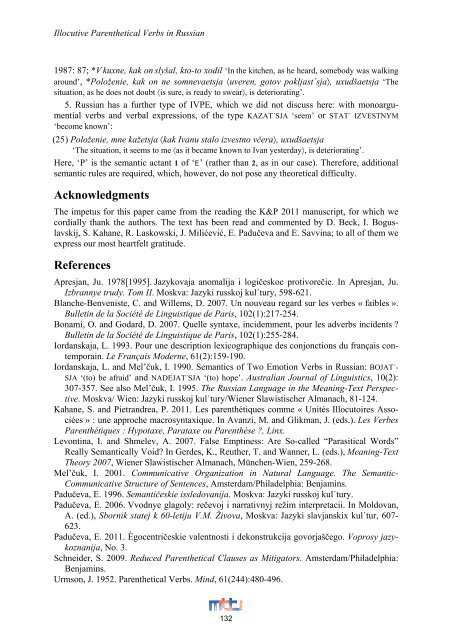Illocutive Parenthetical Verbs in Russian - Observatoire de ...
Illocutive Parenthetical Verbs in Russian - Observatoire de ...
Illocutive Parenthetical Verbs in Russian - Observatoire de ...
You also want an ePaper? Increase the reach of your titles
YUMPU automatically turns print PDFs into web optimized ePapers that Google loves.
<strong>Illocutive</strong> <strong>Parenthetical</strong> <strong>Verbs</strong> <strong>in</strong> <strong>Russian</strong>1987: 87; *V kuxne, kak on slyšal, kto-to xodil ‘In the kitchen, as he heard, somebody was walk<strong>in</strong>garound’, *Položenie, kak on ne somnevaetsja 〈uveren, gotov pokljast´sja〉, uxudšaetsja ‘Thesituation, as he does not doubt 〈is sure, is ready to swear〉, is <strong>de</strong>teriorat<strong>in</strong>g’.5. <strong>Russian</strong> has a further type of IVPE, which we did not discuss here: with monoargumentialverbs and verbal expressions, of the type KAZAT´SJA ‘seem’ or STAT´ IZVESTNYM‘become known’:(25 ) Položenie, mne kažetsja 〈kak Ivanu stalo izvestno včera〉, uxudšaetsja‘The situation, it seems to me 〈as it became known to Ivan yesterday〉, is <strong>de</strong>teriorat<strong>in</strong>g’.Here, ‘P’ is the semantic actant 1 of ‘E’ (rather than 2, as <strong>in</strong> our case). Therefore, additionalsemantic rules are required, which, however, do not pose any theoretical difficulty.AcknowledgmentsThe impetus for this paper came from the read<strong>in</strong>g the K&P 2011 manuscript, for which wecordially thank the authors. The text has been read and commented by D. Beck, I. Boguslavskij,S. Kahane, R. Laskowski, J. Milićević, E. Padučeva and E. Savv<strong>in</strong>a; to all of them weexpress our most heartfelt gratitu<strong>de</strong>.ReferencesApresjan, Ju. 1978[1995]. Jazykovaja anomalija i logičeskoe protivorečie. In Apresjan, Ju.Izbrannye trudy. Tom II. Moskva: Jazyki russkoj kul´tury, 598-621.Blanche-Benveniste, C. and Willems, D. 2007. Un nouveau regard sur les verbes « faibles ».Bullet<strong>in</strong> <strong>de</strong> la Société <strong>de</strong> L<strong>in</strong>guistique <strong>de</strong> Paris, 102(1):217-254.Bonami, O. and Godard, D. 2007. Quelle syntaxe, <strong>in</strong>ci<strong>de</strong>mment, pour les adverbs <strong>in</strong>ci<strong>de</strong>nts ?Bullet<strong>in</strong> <strong>de</strong> la Société <strong>de</strong> L<strong>in</strong>guistique <strong>de</strong> Paris, 102(1):255-284.Iordanskaja, L. 1993. Pour une <strong>de</strong>scription lexicographique <strong>de</strong>s conjonctions du français contempora<strong>in</strong>.Le Français Mo<strong>de</strong>rne, 61(2):159-190.Iordanskaja, L. and Mel’čuk, I. 1990. Semantics of Two Emotion <strong>Verbs</strong> <strong>in</strong> <strong>Russian</strong>: BOJAT´-SJA ‘(to) be afraid’ and NADEJAT´SJA ‘(to) hope’. Australian Journal of L<strong>in</strong>guistics, 10(2):307-357. See also Mel’čuk, I. 1995. The <strong>Russian</strong> Language <strong>in</strong> the Mean<strong>in</strong>g-Text Perspective.Moskva/ Wien: Jazyki russkoj kul´tury/Wiener Slawistischer Almanach, 81-124.Kahane, S. and Pietrandrea, P. 2011. Les parenthétiques comme « Unités Illocutoires Associées» : une approche macrosyntaxique. In Avanzi, M. and Glikman, J. (eds.). Les VerbesParenthétiques : Hypotaxe, Parataxe ou Parenthèse ?, L<strong>in</strong>x.Levont<strong>in</strong>a, I. and Shmelev, A. 2007. False Empt<strong>in</strong>ess: Are So-called “Parasitical Words”Really Semantically Void? In Ger<strong>de</strong>s, K., Reuther, T. and Wanner, L. (eds.), Mean<strong>in</strong>g-TextTheory 2007, Wiener Slawistischer Almanach, München-Wien, 259-268.Mel’čuk, I. 2001. Communicative Organization <strong>in</strong> Natural Language. The Semantic-Communicative Structure of Sentences, Amsterdam/Phila<strong>de</strong>lphia: Benjam<strong>in</strong>s.Padučeva, E. 1996. Semantičeskie issledovanija. Moskva: Jazyki russkoj kul´tury.Padučeva, E. 2006. Vvodnye glagoly: rečevoj i narrativnyj režim <strong>in</strong>terpretacii. In Moldovan,A. (ed.), Sbornik statej k 60-letiju V.M. Živova, Moskva: Jazyki slavjanskix kul´tur, 607-623.Padučeva, E. 2011. Ègocentričeskie valentnosti i <strong>de</strong>konstrukcija govorjaščego. Voprosy jazykoznanija,No. 3.Schnei<strong>de</strong>r, S. 2009. Reduced <strong>Parenthetical</strong> Clauses as Mitigators. Amsterdam/Phila<strong>de</strong>lphia:Benjam<strong>in</strong>s.Urmson, J. 1952. <strong>Parenthetical</strong> <strong>Verbs</strong>. M<strong>in</strong>d, 61(244):480-496.132
















